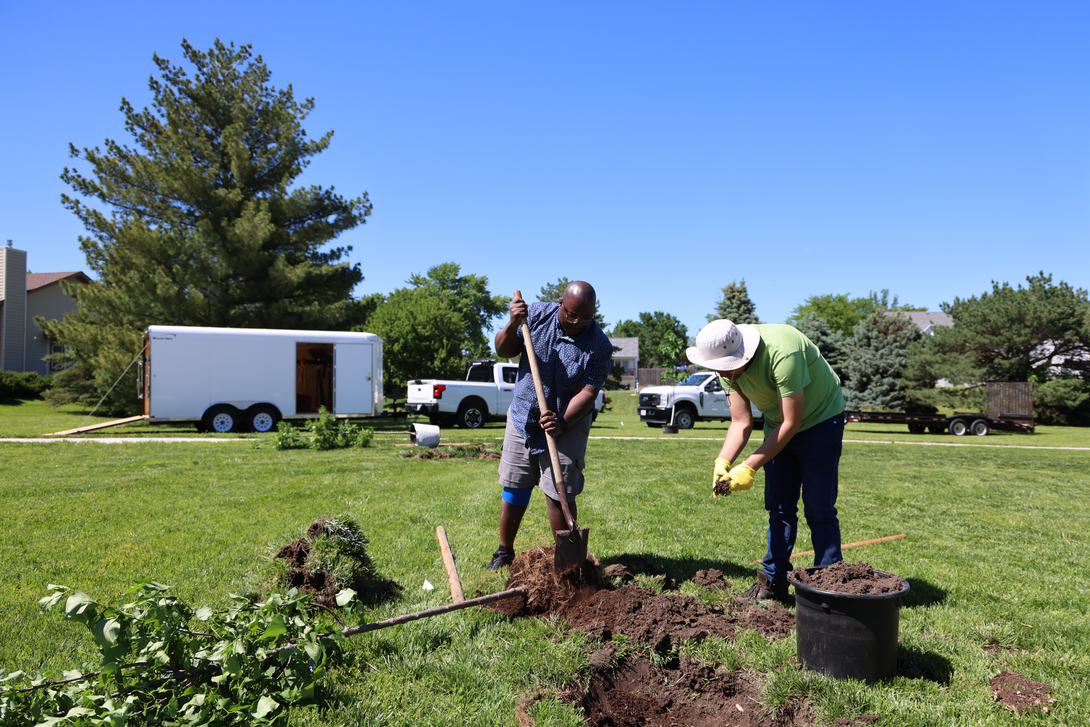
Lincoln, Neb. —Andrew Mwape’s idea for lessening climate change problems resonates in the Arbor Day state. He and volunteers have been planting trees in Lincoln, Nebraska, and paying for trees to be planted in Uganda and Zambia, his home country.
A doctoral student in the School of Natural Resources, Mwape specializes in climate impacts and assessment and has been studying drought in his work with the National Drought Mitigation Center. He said climate change increases the frequency and severity of drought in the sense that when temperatures rise, evapotranspiration increases and the natural timing of the ecosystem to provide water is disturbed. Planting trees can help lower temperatures and risks, he said.
“The beauty with trees and the relevance with trees in the picture is that they act as carbon sinks,” he said. “They capture carbon emissions from the atmosphere, thereby reducing global warming and reducing the threats of severe droughts and severe consequences from climate change.”
Working as the president of the Lincoln East Rotary Club since 2023, Mwape has led the club in planting 95 trees in parks around Lincoln and more than 300 trees in Zambia. The club just approved spending another $4,000 to plant more trees in Zambia in the coming year, he said.
In Uganda and Zambia, the club has been paying for the planting of mangos, oranges, guavas, lemons, jackfruits and avocados in communal spaces such as churches and schools. Members chose fruit trees to offer an incentive for locals to plant and look after the trees, Mwape said. In an agreement with local Africans, the fruits will not be sold but given freely to the community.
Fruit trees in Zambia cost about $10, a fraction of the costs in the United States, Mwape said. Lower costs in developing nations allow funds to go further and have more impact in carbon-reducing efforts, he said.
“I know there's a lot of initiatives with airlines and private companies that get money in terms of carbon emissions and carbon crediting, carbon offsets to invest in projects in places like Zambia, but planting community-based trees that directly benefit communities is more beneficial than giving a consultant the money,” he said.
He praised the Rotary Club for stepping up to help with global challenges and disasters and said he has the goal for it and everyone to become more proactive rather than reactive.
“We need to invest more into preparation, being proactive, mitigating the impact of climate change and drought rather than being more ready to respond and being reactive when it happens, because when disaster strikes, everybody swings into defensive mode,” he said. “Nobody's thinking about their neighbor, but if we have a laid out, clearly thought-out action plan already, it makes it easy for communities to respond, for where to find resources, how to mobilize resources, than having all that done during a disaster.”
Mwape also stressed reducing, reusing and recycling resources like water.
For countries like Zambia that depend on rainwater for farming, he said ecosystem health must be a priority in policy and management. For instance, city planners need to know the underground geology to not build infrastructure over water recharge points and should plant and protect more trees to support the rain cycle, he said.
The tools used to mitigate effects of climate change, like drought, are different for different areas, he said.
For the Midwest, he suggested one tool might be harvesting snow and storing it in tanks for later use.
Nebraska does a good job conserving water, especially in rural areas, he said, where farmers conserve water with newer irrigation equipment.
He suggested that existing community projects include planting trees. For example, plans for building a hospital should include trees. A landowner planning to install a wire fence could plant trees as posts. Schoolteachers teaching children about the environment could plant trees.
“If communities can be engaged in the development of those tools, it increases the efficiency and the chances of those tools being used,” he said.
The best place to begin in being proactive is in the way people think about the risks of climate change and prepare for them, he said.
“The thing is, climate change is a normal part of every climate system,” he said. “So, if you're not experiencing it today, at one day, one time, you will experience it, and in drought science, there's a clear distinction between risk management and response approaches to managing drought.
Mwape came to Nebraska on a Mandela Washington Fellowship and has worked with Mike Hayes, climatology professor, as his advisor. Under Hayes’s direction, he has been working with the Department of Natural Resources to engage the public in the Republican River Basin in drought issues.
He said he loves working with and mobilizing people and hopes his career after graduating involves outreach and the chance to develop drought plans, climate plans or farm plans. Regardless of the position, he said he will continue planting trees and advocating for them.
“We need to be more proactive in our response to whatever scientific knowledge we have,” he said. “For me, planting trees is one of those efforts that each one of us can do.”







